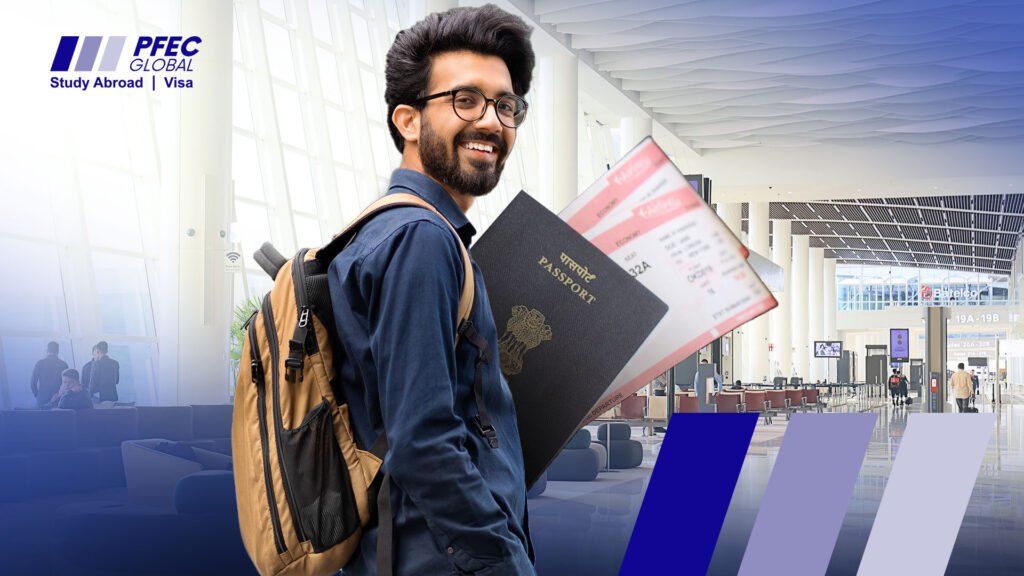Guiding Indian Students on Compliant International Study and Work Experiences
- Priyanka Chandwani
- 8 min Read
Studying abroad offers Indian students global exposure and career growth—but staying compliant is essential to protect those opportunities. Understanding visa rules, academic expectations, and legal work limits helps students avoid costly mistakes like suspensions or visa cancellations. With the right preparation, verified information, and early guidance from PFEC Global, students can stay focused on their goals while building a secure path to graduation, employment, and permanent residency. Informed, compliant decisions today lay the foundation for success tomorrow.

Indian students abroad face detailed academic, legal, and work-related rules. A small mistake, like skipping class or working overtime, can cause serious problems. These include visa cancellations, academic suspensions, and restrictions on future travel.
To stay compliant, students need to understand:
- The conditions of their student visa
- Their rights and limits in the workplace
- Academic responsibilities, including attendance and plagiarism policies
Many students rely on peer advice instead of verified sources. This creates confusion and risk. Trusted guidance helps students focus on learning and career building, not fear or uncertainty.
Guiding Indian students on compliant international study and work experiences ensures more than just safety. It empowers students to make smart decisions that protect their future.
Why Guiding Indian Students on Compliant International Study and Work Experiences Matters
When students don’t follow local rules, the consequences are serious and often permanent. These are common situations, not rare exceptions.
What can go wrong:
- Visa violations
Missing class or working beyond legal limits may result in visa cancellation. - Academic penalties
Plagiarism, missed deadlines, or fake documents can lead to suspension or expulsion. - Blacklisting or deportation
Some countries report violations to immigration databases, affecting future visa approvals. - Unsafe or illegal work
Taking unregistered jobs or working without contracts can harm both safety and legal status.
Why proper guidance matters:
- Students receive accurate information about what is allowed and what is not
- Mistakes are easier to avoid with early, trusted support
- Legal awareness builds confidence when navigating new systems
- Responsible behavior helps students succeed in study, work, and settlement goals
Expert Tip: Always verify any advice with your university, official visa channels, or a certified advisor like PFEC. Avoid depending on social media posts or second-hand student groups.
Key Compliance Areas Indian Students Must Understand Before Going Abroad
Before leaving India, students must understand how compliance works in both academics and work settings. This is key to avoiding penalties and building a successful experience abroad.
Must-know compliance areas:
- Student visa conditions
Know your visa type, expiration date, and what activities are allowed. - Work-hour limits
Most countries allow part-time work, but only within fixed hours. - Academic honesty rules
Plagiarism, fake submissions, or copying can lead to serious academic penalties. - On-campus vs. off-campus work
Some visas limit where and when you can work. Check local laws. - Mandatory reporting
Always update address, course status, or job changes with the right authority.
Country-specific examples:
Country | Weekly Work Limit | Key Rule to Know |
Australia | 48 hours (from July 2023) | Must attend 80% of classes |
Canada | 20 hours (off-campus) | IRCC must be updated if you change schools |
UK | 20 hours (term time) | No self-employment or contract work allowed |
US | 20 hours (on-campus only) | Off-campus work needs special approval |
Expert Tip: Every university shares a compliance handbook at orientation. Read it in Week 1. Ask questions if anything is unclear.
For a full comparison of work-study rules by country, visit our destination overview page.
Benefits of Proper Compliance Guidance for Indian Students Studying Abroad
Clear guidance helps Indian students avoid legal or academic trouble and focus on their goals. Understanding compliance guidance and work experiences builds both safety and long-term stability.
Key benefits of staying compliant:
- Lower stress levels
Students who understand the rules can plan with clarity and confidence. - Stronger visa security
Following all terms helps prevent cancellations and protects future visa applications. - Academic stability
Compliant students stay in good academic standing and avoid disciplinary action. - Better job readiness
Employers prefer candidates who respect legal and workplace rules. - Stronger path to permanent residency
Most countries expect a clean record when considering PR or work visa applications. - Smoother career growth
Students with no legal issues move more easily into post-study employment.
Compliance is not just about avoiding problems. It’s a foundation for personal and professional growth.
Expert Tip: Always store digital copies of your visa, work documents, and academic policies. Check for updates regularly to stay current.
Common Challenges Faced by Indian Students in Staying Compliant
Even sincere students can break rules without knowing it. Most problems come from poor information, not bad intent.
Common reasons students break compliance rules:
- Peer pressure
Friends may suggest working extra hours or skipping class for short-term gain. - Lack of clear understanding
Many students do not read their visa or university terms in detail. - Confusing academic systems
Grading, attendance, and plagiarism rules may differ from what they knew in India. - Bad advice online
Social media or messaging apps often share outdated or incorrect guidance. - Unclear communication from agents
Some counselors fail to explain rules and student responsibilities properly.
Real example:
A student in Canada accepted freelance work off-campus. This counted as unauthorized self-employment. During visa renewal, immigration flagged the violation, and the application was denied.
Expert Tip: Always verify rules through official sources like university portals, immigration websites, or experienced consultants such as PFEC. Never assume someone else’s situation is the same as yours.
Insights for Study Abroad Planning: How to Build a Compliance-First Mindset
The goal is not just to follow rules, but to build habits that protect your future.
Steps to stay compliant from Day 1:
- Attend pre-departure sessions
These often include important legal and academic orientation. - Consult official sources regularly
Bookmark your host country’s immigration website and check for updates. - Ask your university advisor before acting
Confirm before changing jobs, moving houses, or dropping a course. - Avoid shortcuts
Don’t risk your visa for quick money or temporary relief. - Keep records of permissions and documents
Store visa letters, payslips, job contracts, and approval emails—both digitally and in print. - Understand what counts as a violation
Even minor errors can show up during visa renewals or PR applications.
Expert Tip: Parents should stay involved too. Ask your child to update you monthly on academic and legal matters. It builds accountability and confidence.
The Role of Education Consultants in Compliance Guidance
Expert consultants play a key role in helping students stay compliant. When families ask why compliance guidance and work experiences matter, the answer often includes one word: preparation.
What PFEC Global does to support compliance:
- Checks document accuracy
Mistakes in forms, SOPs, or financial papers can delay or harm visa approvals. - Explains visa conditions clearly
Students understand work limits, course load rules, and renewals before departure. - Prepares students through one-on-one sessions
Guidance is matched to each country, course, and visa type. - Supports parents with trusted information
Families can ask questions and get clear, verified answers. - Offers post-arrival mentoring
Students stay updated on rule changes and know where to get help abroad.
Expert Tip: Consultants like PFEC track immigration updates regularly. Students often miss these changes when relying only on peers or social media.
Cultural Adjustments That Affect Compliance: What Indian Students Should Know
Many compliance issues happen because students carry Indian habits into very different systems.
Common cultural differences that lead to unintentional violations:
- Classroom etiquette
In some countries, missing class affects your visa status. Attendance is tracked strictly. - Academic honesty
Copy-pasting from the internet—even once—can lead to disciplinary action. - Deadlines and extensions
Late submissions often get zero. Excuses are rarely accepted without documents. - Group work and participation
Marks are tied to class interaction. Staying silent may hurt grades. - Part-time job ethics
Arriving late or quitting without notice can lead to bad references or reports.
Example:
A student in the UK thought using the same project from a previous class was fine. The university called it self-plagiarism and issued a warning. It stayed on his academic record.
Expert Tip: Learn the rules before classes start. Many universities offer free orientation on academic culture.
How to Recover From Unintentional Compliance Mistakes Abroad
Even responsible students sometimes make mistakes. What matters is how quickly and honestly they respond. If you’ve broken a rule unknowingly, take action right away.
Steps to recover:
- Speak with your university’s international office
They can guide you on official procedures and next steps. - Write a clear explanation
Be honest about what happened and when. Avoid blaming others. - Gather supporting documents
Emails, payslips, medical records—anything that explains your situation. - Consult a legal advisor or student advocate
Many universities offer free legal help for enrolled students. - Inform your PFEC Global advisor
They can help you respond correctly and avoid further risks.
Example:
A student in Australia worked extra hours during peak season without realising the new limit. He reported it early to his university. They guided him to write a formal statement. No visa action was taken, and he received a written warning.
Expert Tip: Early reporting often leads to support. Waiting can lead to penalties or visa issues.
Conclusion
Compliance is not just about following rules. It protects your degree, visa, job prospects, and long-term plans.
Students who understand legal and academic requirements can avoid setbacks and focus on progress. With the right guidance, they build confidence, act responsibly, and grow into capable professionals.
The journey becomes smoother when decisions are based on facts, not assumptions.
Expert Tip: Always stay updated. Recheck official policies at key milestones like enrollment, job applications, and visa renewals.
FAQs
What are the biggest compliance risks for Indian students studying abroad?
Common risks include working more than allowed hours, missing classes, and academic dishonesty.
How can I stay updated on visa and work regulations while studying overseas?
Check official immigration websites, attend university briefings, and speak with PFEC advisors regularly.
Can non-compliance affect my chances of permanent residency or future visas?
Yes. Rule violations can stay on record and affect future applications for PR or work visas.
Is working more than permitted hours during semester breaks allowed?
Some countries allow full-time work during breaks, but rules vary. Always check official guidelines.
Why is early guidance important for avoiding compliance issues abroad?
It helps students understand their limits and responsibilities from the start, reducing costly mistakes.

Take your Study Abroad Dreams to the Next Level
Receive free end-to-end assistance and personalized guidance from experts
Get Started for FREE →

